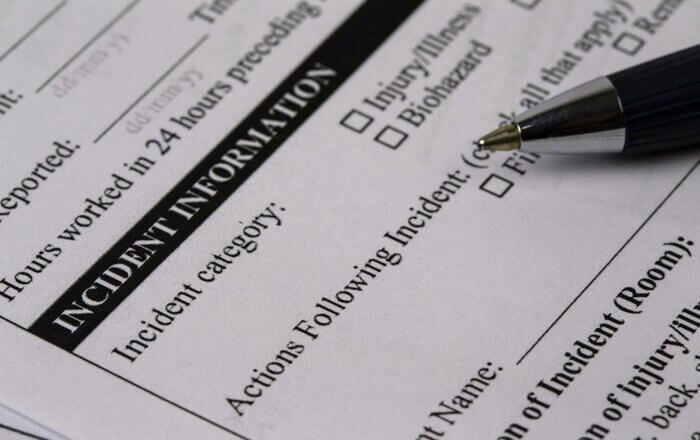Written By:
 Salvatore Nuzzo
Salvatore Nuzzo
Your Dedicated & Trusted Legal Team
3 Generations & 100+ Years of Combined Legal Experience

Every insurance claim is investigated thoroughly. In theory, each party should be given no more and no less than they are entitled to, in accordance with need and level of fault. Often, however, people do things that unnecessarily hurt their claim. As a result, their award amount is often reduced, and in extreme cases, are denied entirely. During my 30-plus years as an insurance adjuster, these are the things that people most often do to hurt their claim.
Talking too much
This is the most common problem. People volunteer too much information. When speaking to an insurance adjuster or an attorney representing the other party, just answer what’s asked of you in plain and simple language. If someone asks, “What did you eat for lunch?” you should say, “A cheeseburger.” Don’t say you had 80/20 beef chuck with one slice of American cheese and a dollop of ketchup from the Five Guys on Merrick Avenue.
You may feel like you’re being thorough, but odds are something is going to come out of your mouth that you can’t put back in. You could inadvertently contradict yourself or offer a detail that is not flattering to you or your situation. So keep it simple.
Guessing, estimating, or being vague
You need to be specific when discussing your claim, especially when it comes to pain and injuries. Any vagueness will be used against you. If you say it hurts “a little bit,” an attorney can interpret that any way they want. But if you say your pain was a 5 out of 10, that’s pretty concrete. If you’ve been keeping a pain journal as I suggested in an earlier article, then you can offer a detailed timeline of your pain and recovery process.
The same goes for costs, time, or any other quantifiable factor. You should be keeping a folder of accident-related financial burdens, as well as a log of time spent visiting doctors or attending therapy sessions.
Exaggerating
This applies to everything: injuries, pain, damages, etc. If you blow even one thing out of proportion and get caught, your whole claim loses credibility. Perhaps you told an adjuster that you got hit from behind and your head hit the steering wheel. Insurance companies know the level of impact needed for the force to reach the front seat of the car and cause a body to bounce back and forth like that. The adjuster is going to look at photos of the car damage and determine if what you said is plausible.

Handling the claim by yourself
If you have a fender bender with no injuries, then you can probably handle that by yourself. But if you have moderate or serious injuries, then there are a lot of factors that need to be identified for recovery. It’s hard, especially when you’re hurt, to keep track of every little thing. An attorney can help with that, as well as help you prepare to be questioned (more on that below), and handle negotiations.
Failing to prepare before you speak
When you’re speaking with an adjuster or an opposing attorney, you don’t want to wing it or talk off the top of your head. Know what therapies you’re undergoing and the medications you’ve been taking. Be versed on where your injuries are and what doctors have been telling you. More importantly, work with your attorney to hash out answers to common questions an adjuster might ask you.
Lacking respect for the attorney and the process
A lot of insurance claims take time to resolve—from a couple of months to a couple of years. Don’t be a pain in the butt. Don’t constantly call your attorney to find out what’s going on (once in a while is OK).
Likewise, don’t argue with your attorney, or act defensive or combative with him or her. If you do, he or she may want to just be done with the claim. That means a hasty negotiation and less compensation. Understand the timeframe that a claim can take and be cooperative and patient.
Making contradictory statements and other inconsistencies
When the medical provider is telling you not to drive, only perform light duty, etc., don’t do anything outside of that recommendation. Don’t exert yourself. Not only is this bad for your recovery it’s also bad for your claim.
Have prepared answers and know where your claim is. Sometimes adjusters call up and ask, “How are you doing?” If you respond in a vague or inconsistent manner, you can weaken your claim. The insurer might ask, “You told me you were getting better but now you’re having surgery. How’d that happen?” That sounds like someone fishing for something to claim.
Work with your attorney to outline a fact-based narrative for your injuries, treatments, and road to recovery. Then stick to it.
Sharing too much with the wrong people
Details about your injuries and the claim process should be kept to a small, select few. There’s a couple of dangers here.
The first danger here is when you share information it can make its way back to another party’s attorney or insurance adjuster (and you’d be surprised how often it does). If those details are different from what you’ve been saying in your claim, that will damage your credibility and reduce any payment.
The second danger is that someone may give you bad advice that can damage your approach to the claim. Maybe Uncle Frank tells you he knew a guy with a similar injury who got $300,000, but your attorney estimates your claim is worth much less money. Now you might be tempted to push your attorney to ask for more money, which could put the two of you at odds or ruin negotiations. The only people you should be talking to, and listening to are your attorney and your medical providers.
Putting too much on social media
If you have friends and family talking about your claim on the internet, you are creating a paper trail for someone to follow, scrutinize, and use to discredit if possible. Limit photos and photo sharing. Don’t give anyone anything comparable. Maybe you went to the beach with your wife and kids because you felt you were having a good day. If you look well and are smiling in that photo, it calls your suffering into question (even if most days are miserable for you). That sounds petty but it’s how many attorneys discredit opposing parties, and it works.
Underestimating how many forms of communication exist
Texts, phone calls, emails—an attorney can ask for all of this. If you discuss your claim in any of these mediums, watch out! Again, inconsistencies, even innocently made, can harm your claim. You can’t fight the paper trail.
Going on trips / missing therapy
For a person who is hurting and under a medical regimen of treatment, it is a bad idea to miss a week or two of therapy because you went on vacation. Now someone can ask how you got around, what you did, etc. If it can be made to sound like you’re not suffering as much as you claim, then it will be used against you.
In addition to making an injury seem less serious, it can also be presented as you not doing everything possible to get better. These two factors combined can reduce the final claim amount. You are better off canceling any pre-planned trips, as those can become leverage later on (see below).
Forgetting who else is impacted by your injuries
You may have been the only family member who was hurt in the accident, but others around you may be affected in ways you are taking for granted. For example, if a neighbor helps cut your grass, this is compensable. If your mom comes over a few times a week to do laundry or help with the kids, you need to mention this. Sure those favors don’t cost money but maybe you want to thank them. More importantly, it’s now not just you whose life is changed; it’s theirs too.
This is especially true of spouses and domestic partners. If you used to cook dinners and now your spouse has to because you can’t stand for long periods of time, he or she is suffering and has to change his or her schedule. A big mistake that people make is to assume that consortium claims (when a spouse or domestic partner of an injured party claims damages) are baked into a claim. Nonsense! Highlight their struggle too. Your spouse will also need to sign off on that claim so he or she needs to be compensated just like you do.
Going back to my earlier comments about vacations and trips, any canceled plans are hardships, even if most or all of the money is refunded. For example, if you had to cancel your first trip to Disney World with the kids, that disappointment is suffering—yours and theirs—and your family deserves compensation for that.

Failing to describe how different your life is
Serious injuries can turn your life upside down, but you’d be shocked how hard it is for some people to articulate how different things are after the accident. For example, your bedroom may be on the second floor. Getting up those stairs at night used to be no big deal but now it could be a chore to drag yourself up there.
Consider how much sleep you used to get before the accident compared to now. Did you cook on the weekends but now find standing difficult? Does your knee hurt too much to practice soccer with the kids? Make an exhaustive list of everything that now takes more effort or is no longer possible. I guarantee you that list will be longer than you think.
Leaning too much into your hobbies
If you go fishing every weekend, someone is going to get the impression you are not as hurt as you claim. Maybe you’re on disability or workman’s comp and have the time, and it’s not like fishing is labor intensive. But you’d be surprised how that can be twisted to make it look like you’re living your best life, and thus don’t need much money.
The same can be said of any trackable hobby. Let’s say the accident prevents you from performing your main job as a fitness instructor, so you start knitting more. Don’t share details about your hobby or sell them on etsy.com lest the opposing attorney imply you’ve reinvented yourself and are doing better than you claim.
Of course, you may need those hobbies to keep your spirits up. So don’t give them up. Just make sure not to overdo it in such a way that could be used against you.
Putting it all together
The bottom-line advice is to be thorough and clear in documenting the impact of your injury, but concise in your communication. Share information only with those who need it. Trust your attorney and be honest with him/her and yourself about your situation. And lastly, stay under the radar until after the claim is settled.
ABOUT THE AUTHOR:

Salvator Nuzzo has spent more than 30 years as an insurance adjuster for various major insurers. Throughout his career, he has handled an estimated 8,000 claims.

 Salvatore Nuzzo
Salvatore Nuzzo
About The Author
Salvator Nuzzo has spent more than 30 years as an insurance adjuster for various major insurers. Throughout his career, he has handled an estimated 8,000 claims.
Read MoreLatest from Our Blog



Editorial Standards
Rosenblum Law is committed to delivering informative content of the highest quality. All content is subject to our rigorous editorial standards for relevance, accuracy, sourcing, and objectivity. Everything is fact-checked by an editor and reviewed for legal soundness by one of our practicing attorneys prior to being published.
How to Cite Rosenblum Law’s Article
APA
Salvatore Nuzzo (Nov 18, 2021). 14 Ways to Get the Most from Your Accident Claim. Rosenblum Law Firm, https://rosenblumlaw.com/14-ways-to-get-the-most-from-your-accident-claim/
MLA
Salvatore Nuzzo "14 Ways to Get the Most from Your Accident Claim". Rosenblum Law Firm, Nov 18, 2021. https://rosenblumlaw.com/14-ways-to-get-the-most-from-your-accident-claim/





